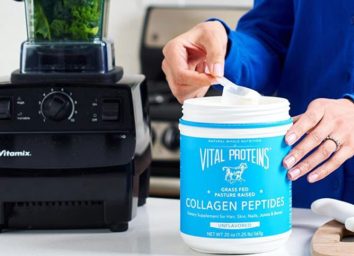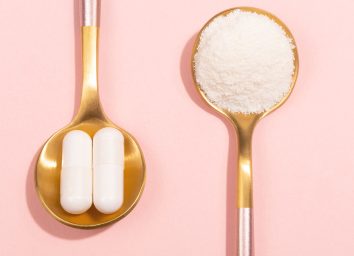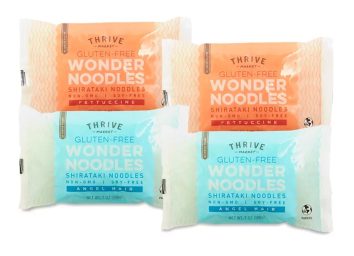These 10 Foods Are Better Than Collagen Supplements
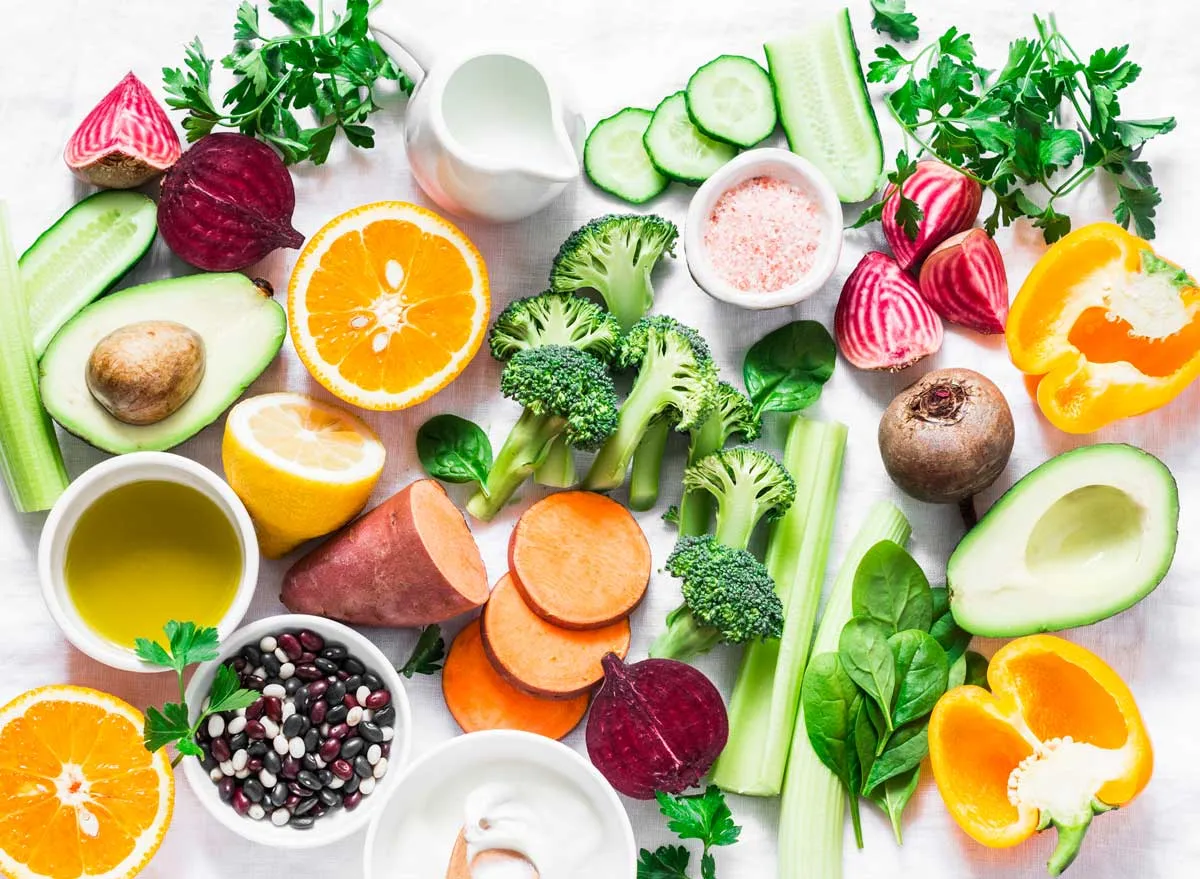
Given the dozens of flashy (not to mention, expensive) collagen supplements currently flooding the market, you might not have realized there’s a wide array of collagen-rich foods and foods rich in nutrients proven to stimulate collagen synthesis that are likely already sitting in your kitchen pantry.
That’s right. You don’t have to spend money on trendy collagen products created to capitalize on the fad when you can reap the same collagen benefits naturally with a simple, well-informed trip to the grocery store.
What is collagen?
Simply put, collagen is the substance that holds the body together. This structural protein, which is the most abundant protein in the human body, acts as a building block for your bones, teeth, muscles, skin, joints and connective tissues. It supports the appearance of smooth, un-dimpled skin and provides strength to our bones and muscles.
What are the benefits of collagen?
This powerful protein is capable of many essential bodily functions.
- Supports muscle, joint, and tissue health. “Collagen’s function in our body is to keep connective tissues moveable, elastic and strong, in order to prevent brittleness,” says Jim White, RD, ACSM, HFS, Owner of Jim White Fitness and Nutrition Studios. This keeps our joints mobile, and our skin, nails, and hair healthy and less susceptible to damage.
- Firms skin and lessens the appearance of wrinkles. In fact, a study published in Skin Pharmacology and Physiology found that those who took collagen peptides once daily for eight weeks showed a significant improvement in skin’s elasticity.
- Improves gut health. Diana Gariglio-Clelland, RD, a dietitian at Balance One Supplements notes that collagen “even has an impact on the digestive system by impacting the lining of our gastrointestinal tract.” According to a 2011 study, glutamine, an amino acid in collagen, can help preserve gut barrier function.
- May help treat arthritis. A Creighton University Medical Center study found that collagen can also be an effective treatment for arthritis, which is a condition characterized by the breakdown of cartilage and certain connective tissues.
How does eating certain foods increase collagen production?
You can naturally increase your body’s collagen synthesis by consuming two different types of foods:
- foods that are natural sources of collagen
- foods that contain nutrients known to promote collagen production
“Eating [collagen-rich] food such as meat, fish, chicken, eggs and dairy products can help the body create collagen,” explains Gariglio-Clelland.
Another way to increase collagen production is to eat foods with specific collagen-boosting nutrients. “Copper, zinc, and vitamin C work together by operating with each other in connective tissue to help keep collagen strong and elastic,” says White. Eating foods that contain one (or more) of these nutrients can help to increase collagen synthesis.
Why experts recommend eating foods with collagen rather than taking collagen supplements.
Because collagen production decelerates in your thirties, many people have begun to seek out collagen supplements. Though these supplements can be valuable in replenishing the nutrient, there’s still an edge to getting collagen through whole foods.
“As with any supplement, we have very limited research on whether or not we actually absorb these nutrients. On the other hand, nutrients in food are much more bioavailable to us,” Lemein explains. “Therefore, as an RD, my recommendation is to always try to eat your nutrients versus taking supplements.”
White agrees: “Eating whole foods versus collagen supplements will allow you to intake more nutrients rather than limiting your intake to only collagen. Whole foods are functional because they have other properties like enzymes, fibers, etc. over only consuming collagen,” he says.
Plus, buying “collagen powder can consume a lot of your money when you are getting plenty from the foods you eat that will allow your body to make all the collagen it needs,” White says.
How many collagen-rich foods should you consume to increase collagen production?
While collagen can clearly have a positive impact on both internal and external factors associated with your body, experts have not determined the exact amount you should be eating of each nutrient that increases collagen formation within the body.
“I would say the best recommendation to ensure you are allowing your body to have enough collagen production to stay healthy and strong and to consume the recommended daily allowance of vitamin C, zinc, and copper, along with consuming a well-balanced diet and plenty of water.”
What are naturally collagen-rich foods?
White says “each of the [following] foods is high in collagen due to the collagen that is naturally found in bones of animals.” The most common food sources of collagen are:
- lean meat
- fish
- bone broth
- eggs
- spirulina
More on each of these collagen-rich foods below:
Meat
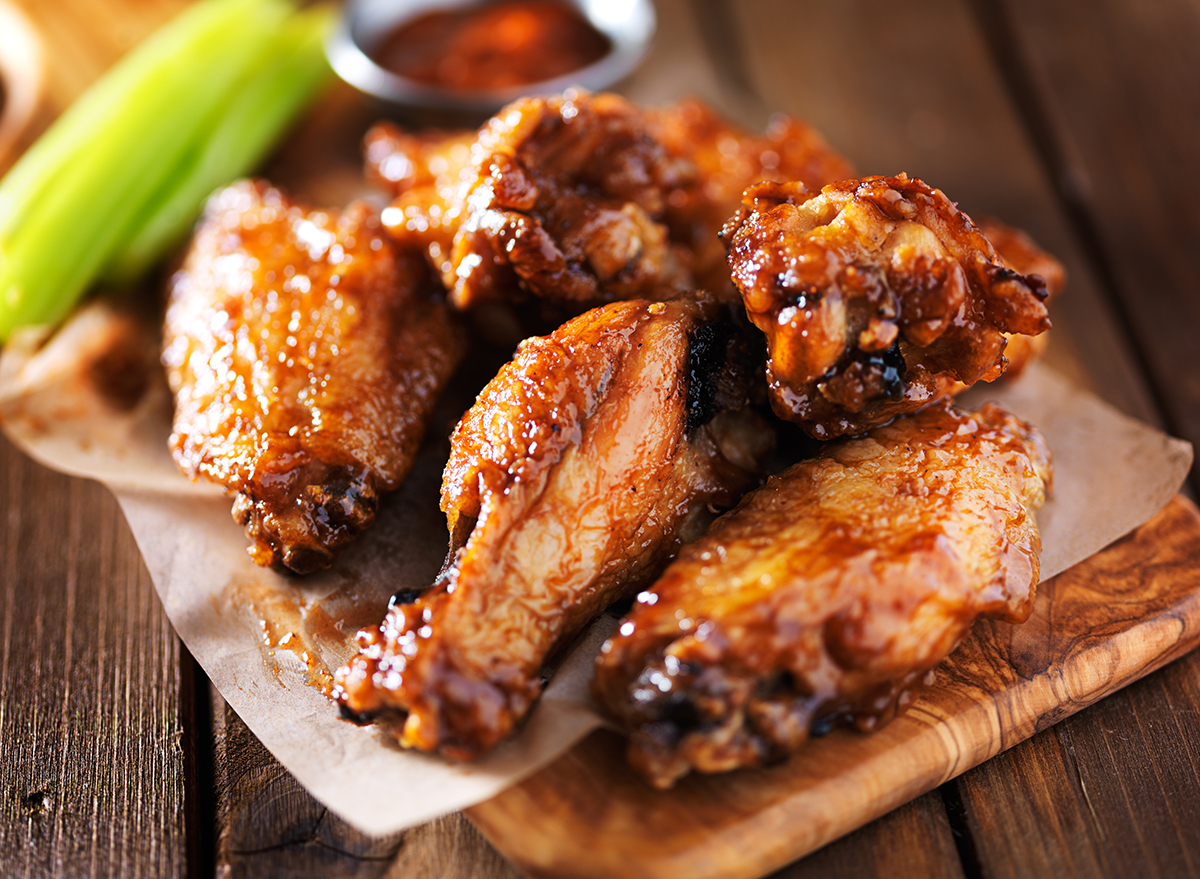
Since collagen is the most abundant protein in mammals, it’s no surprise that it is found in various types of protein-rich meat, including beef and chicken. Furthermore, as White notes, meat sources that include bone and/or connective tissue (such as a ribeye steak or chicken wings) are especially rich in collagen because it is the main component of said tissues.
According to a study in the journal Clinical Interventions in Aging, chicken neck and cartilage can be used to successfully treat arthritis because of its abundance of collagen.
Bone Broth
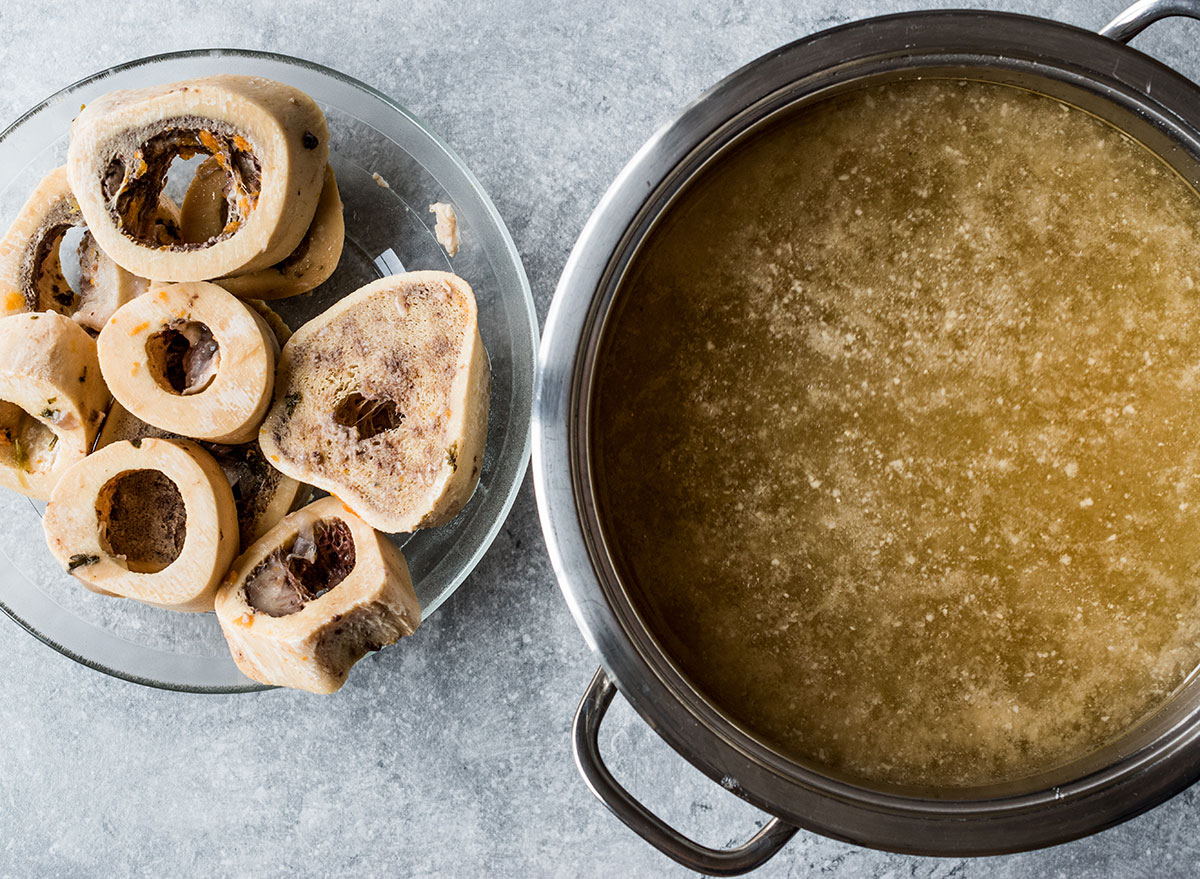
As far as collagen-rich foods go, trendy bone broth is probably the one that people are most familiar with. “Bone broth is a popular option for obtaining collagen without supplements,” Gariglio-Clelland explains. “It is made by simmering animal bones with liquid and some vinegar over a period of 12 to 24 hours to extract the collagen from the animal’s connective tissue.” Animal bones are also a natural source of gelatin, which in and of itself is packed with collagen.
Fish
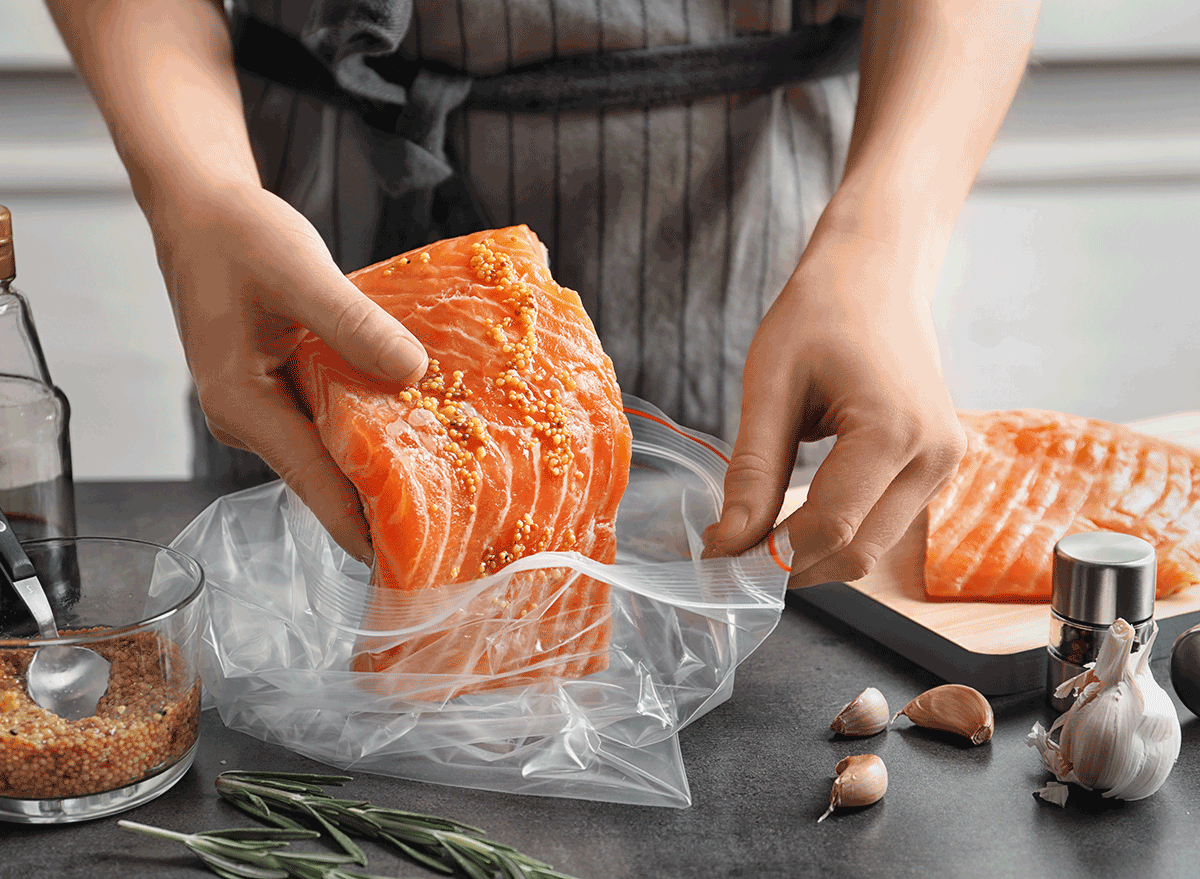
Like other animals, fish and shellfish have bones and ligaments made of collagen, making them a natural source of the skin-plumping substance. Per a study in the journal Food and Nutrition Sciences, fish collagen may even be preferable to collagen found in protein-packed meats such as beef or pork. According to the research, fish collagen is absorbed up to 1.5 times more efficiently into the body when compared to bovine or porcine sources of collagen. Due to the fact that fish collagen is absorbed more efficiently (and therefore enters the bloodstream at a quicker rate) it is considered to be one of the best sources of collagen.
And when you make fish at home, be sure to chow down on the skin, too. Fish skin, which has been used to help heal burn victims, is loaded with collagen.
Egg Whites
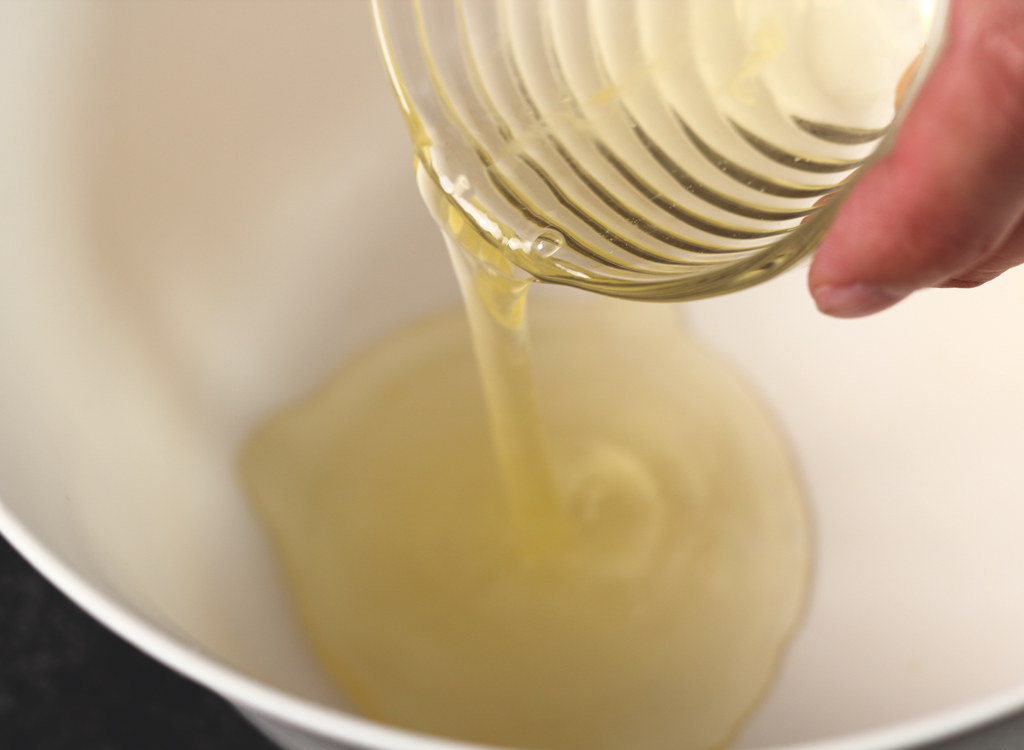
Collagen is naturally found in the shells and whites of eggs. In total, egg whites contain 18 amino acids and all nine essential amino acids.
More specifically, the type of collagen present in egg whites provides glucosamine sulfate, chondroitin sulfate, hyaluronic acid, and various other amino acids necessary for collagen production.
Studies have shown that these substances can help build connective tissues, heal wounds, increase muscle mass and reduce pain or stiffness. In fact, in a 2015 study, researchers discovered that eggshell membranes can have positive effects on the suppression of skin aging and protecting the skin from UVB radiation.
Spirulina

As White notes, more than 60 percent of spirulina consists of amino acids: the building blocks of collagen. Therefore, the blue-green microalgae found in both fresh and marine waters is an excellent source of the stuff. A 2017 study in the journal Pharmaceutical Biology found that when spirulina was incorporated into topical skin creams it improved cell viability and aided wound healing.
Like certain types of meat, spirulina is a great source of protein. In fact, one tablespoon of powdered spirulina yields 6 grams of the muscle-building nutrient.
Which foods increase collagen synthesis and production?
When it comes to how to increase collagen, White explains there are three key nutrients to keep in mind:
- vitamin C synthesizes collagen
- zinc helps collagen production by acting as a cofactor (an activator of essential proteins)
- copper helps the production of collagen by activating the lysyl oxidase enzyme to create collagen maturation. Copper will create links within collagen to keep it functioning properly. If collagen is damaged copper will help repair it to the elasticity it was as well.
There’s one last piece of the puzzle: protein. “By consuming adequate protein (and therefore providing your body with essential amino acids), along with foods rich in vitamin C, zinc and copper, you’re providing your body with the ‘tools’ needed to boost collagen production,” says Amanda Baker Lemein, MS, RD.
Unlike foods that naturally contain collagen, these following 5 foods possess the nutrient building blocks your body requires to make its own collagen.
Citrus Fruits
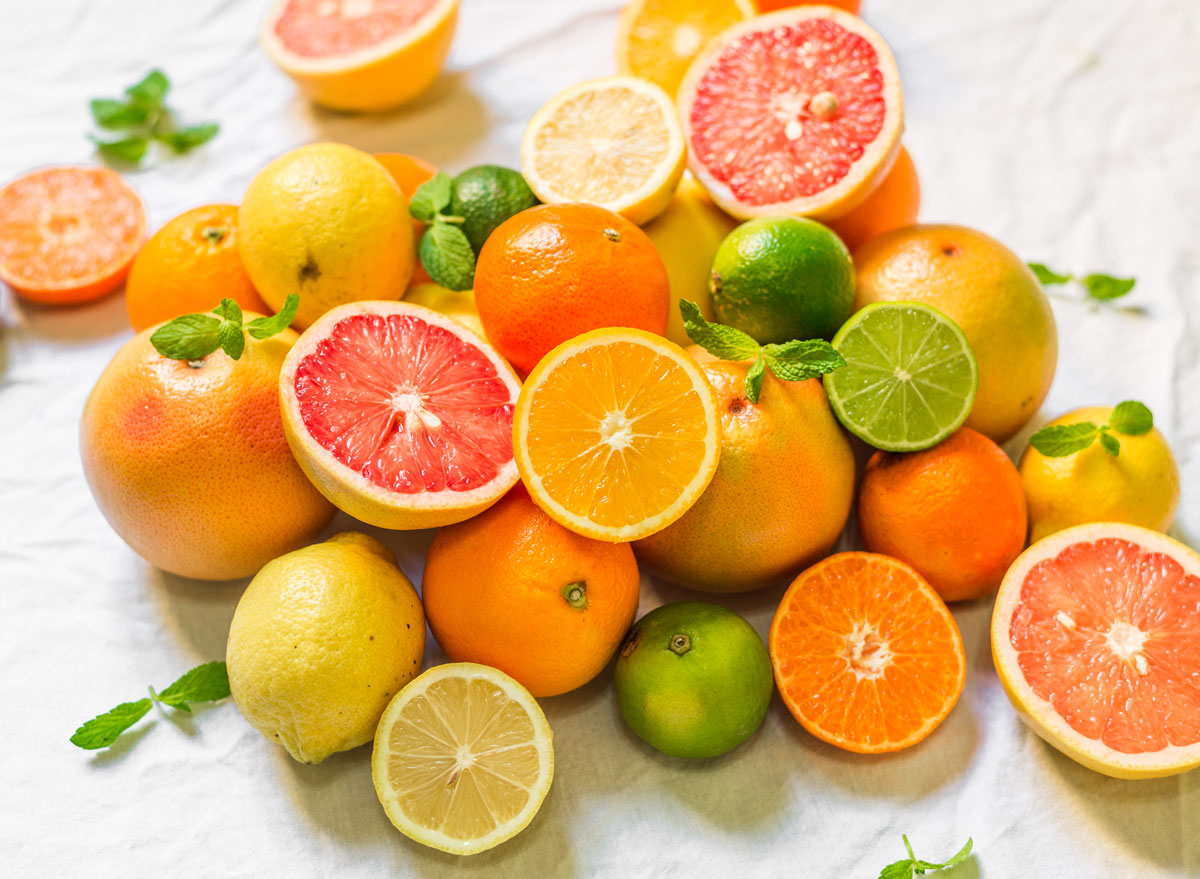
Citrus fruits are great sources of vitamin C, which is required for collagen synthesis.
- grapefruit, 88 mg vitamin C per medium fruit, 97% DV
- orange, 70 mg vitamin C per medium fruit, 77% DV
- clementine, 36 mg vitamin C per fruit, 40% DV
- tangerine, 20 mg vitamin C per fruit, 22% DV
Other foods rich in vitamin C include strawberries (1 cup, 100% DV) and guava (1 cup, 418% DV).
Nuts and Seeds
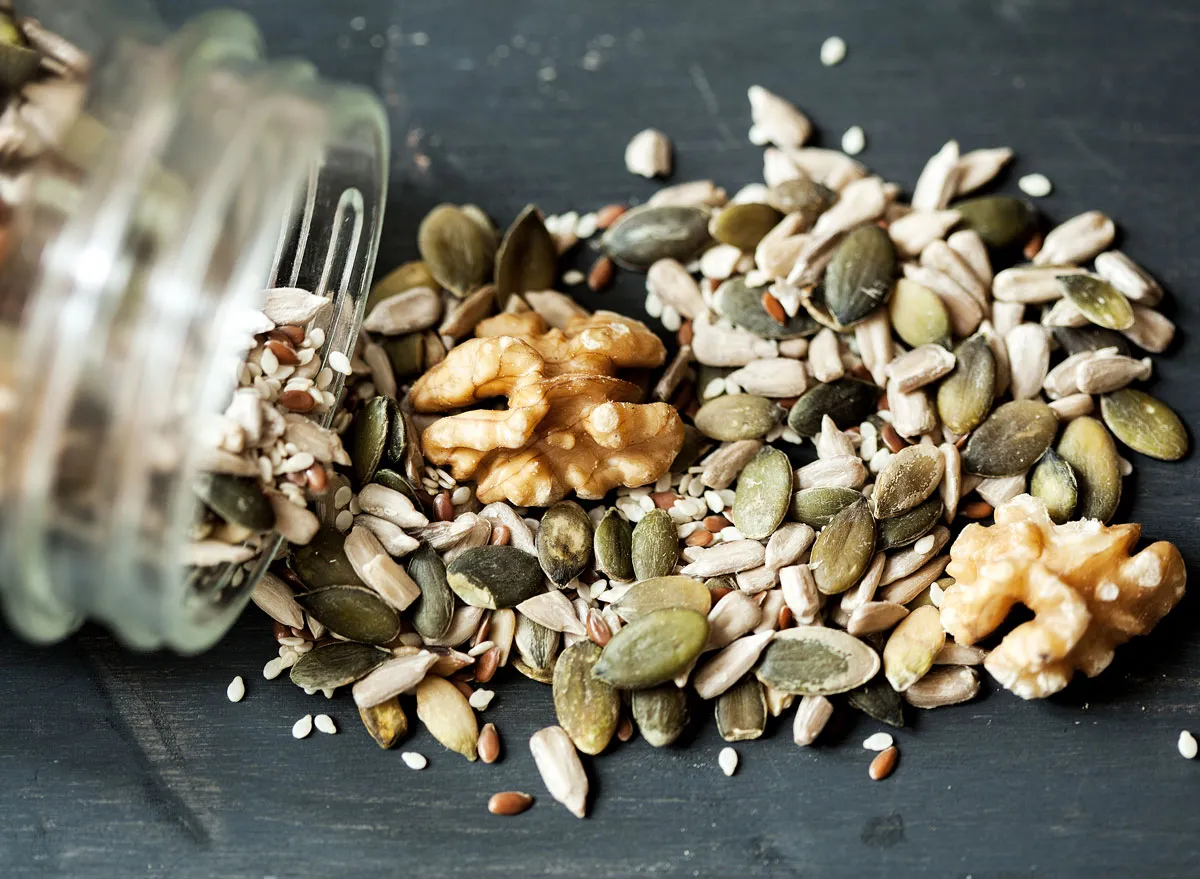
To boost your intake of zinc and copper, two additional nutrients that also promote the production of collagen, look no further than hearty nuts and seeds. The following nuts and seeds are excellent sources (meaning they contain more than 20 percent of your daily value of a nutrient) of either zinc or copper (or both).
- pumpkin seeds, 1 ounce: 2.2 mg zinc, 20% DV; 0.38 mg copper, 42% DV
- cashews, 1 ounce: 1.6 mg zinc, 15% DV; 0.62 mg copper, 69% DV
- almonds, 1 ounce roasted: 0.9 mg zinc, 8% DV; 0.27 mg copper, 30% DV
- sesame seeds, 1 tablespoon: 0.7 mg zinc, 6% DV; 0.37 mg copper, 41% DV
Leafy Green Vegetables
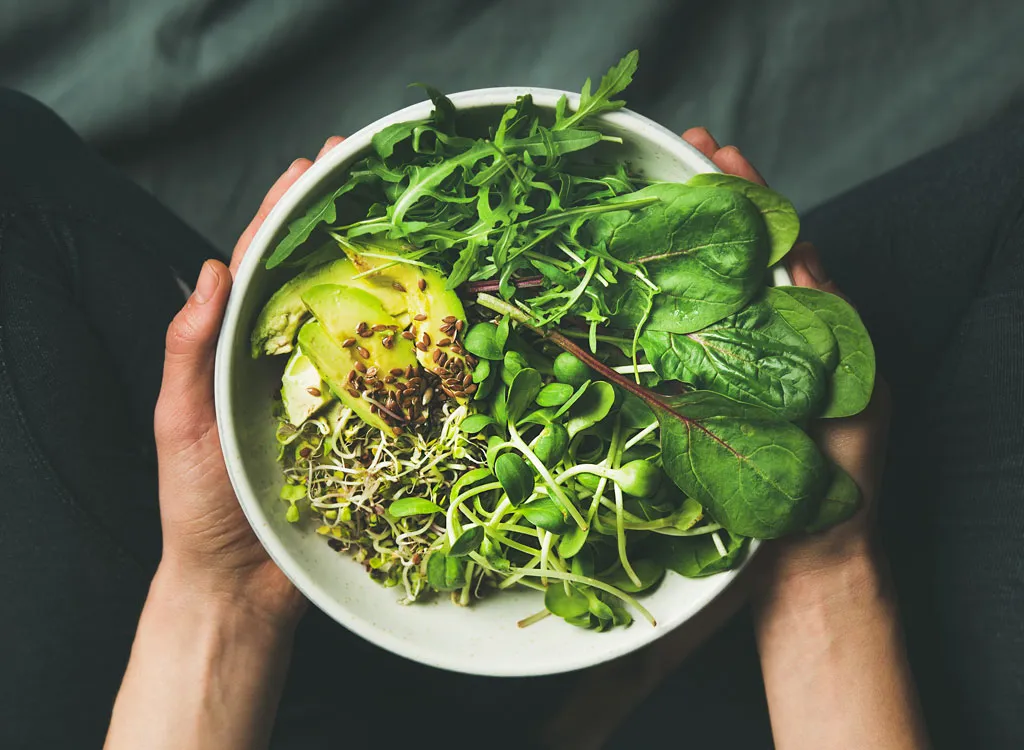
As if you needed another reason to eat leafy green veggies such as kale and spinach, these healthy foods are also high in Vitamin C, zinc, and copper; it’s a collagen-boosting trifecta! In fact, one cup of raw, chopped kale contains nearly one and a half times the recommended daily value of Vitamin C.
Additionally, according to a Korean study, the chlorophyll found in foods like kale has been shown to increase the precursor to collagen in the skin.
Bell Peppers
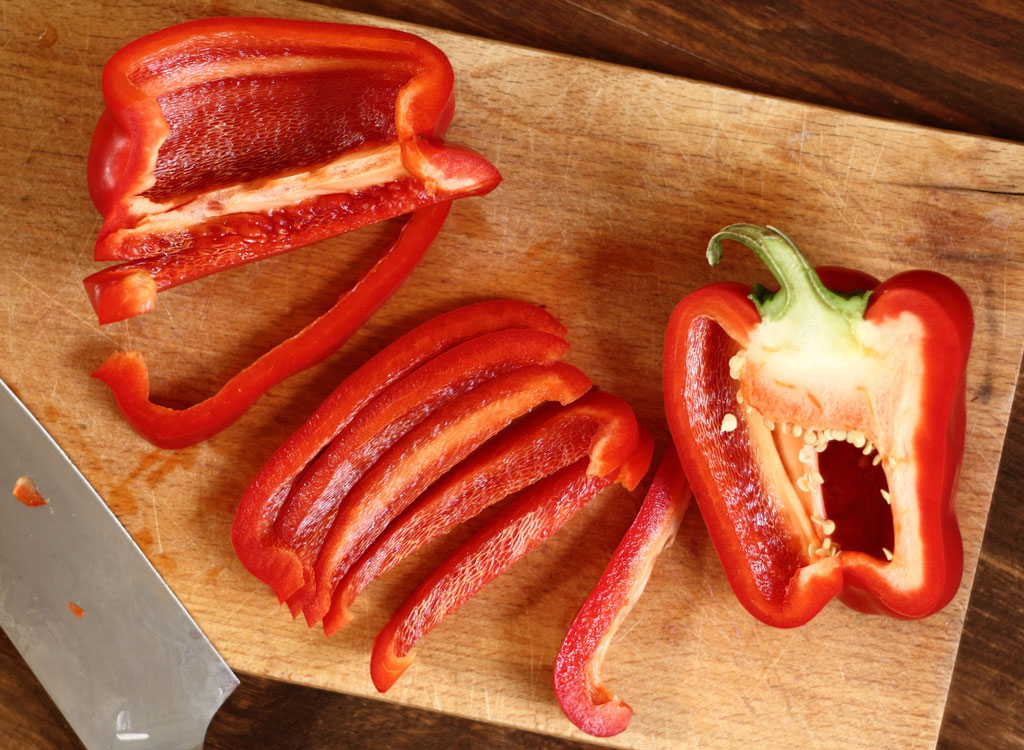
Bell peppers are “great” sources of vitamin C, according to Gariglio-Clelland. Half a cup of sliced red bell pepper, for example, boasts 117 milligrams of vitamin C. That’s nearly one and a half times the recommended daily value of the all-important nutrient.
Bell peppers also contain capsaicin, an anti-inflammatory compound that may combat signs of aging. A 2015 study found that capsaicin, which is typically found in spicy, plant-based foods, increases the stability of collagen fibers in tendons and protects collagen fibrils from enzymatic degradation.
Oysters
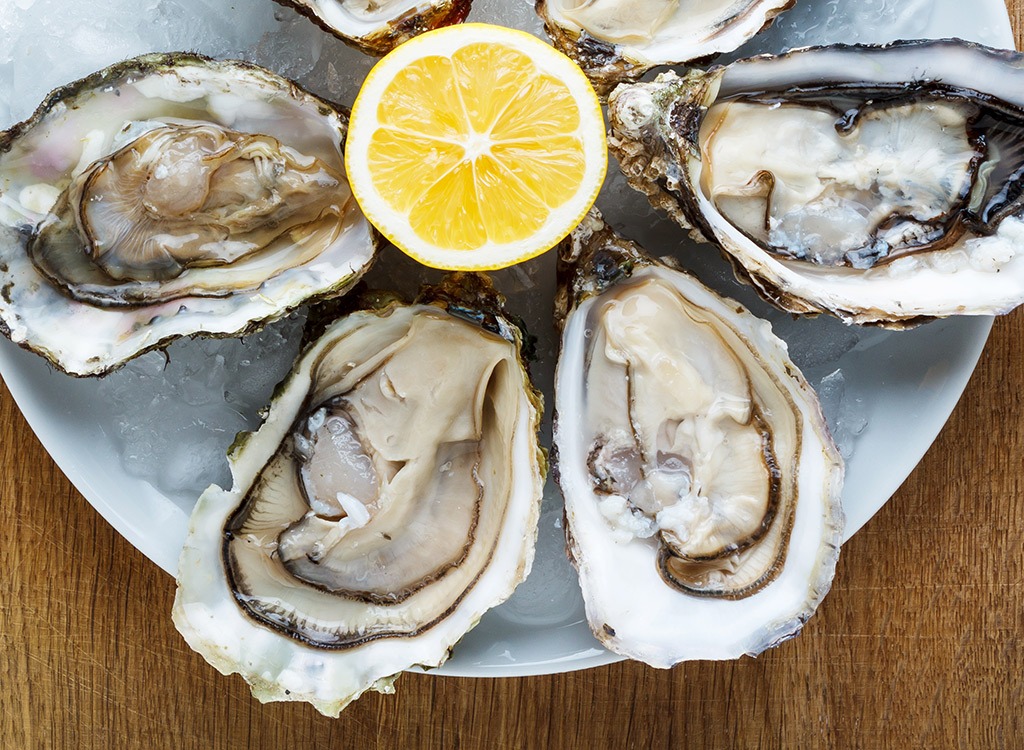
Oysters are hands-down the richest source of zinc. Just three ounces of oysters gets you a whopping 33 milligrams of zinc, exceeding your daily recommended zinc intake threefold. (You would just need to eat two eastern oysters to meet your 11-milligram daily value.) Oysters are also great sources of collagen-creating copper, as just three ounces of the mollusks contain nearly two and a half times the recommended daily value of the nutrient.
Now forget about those costly collagen supplements and stock your grocery carts accordingly!
